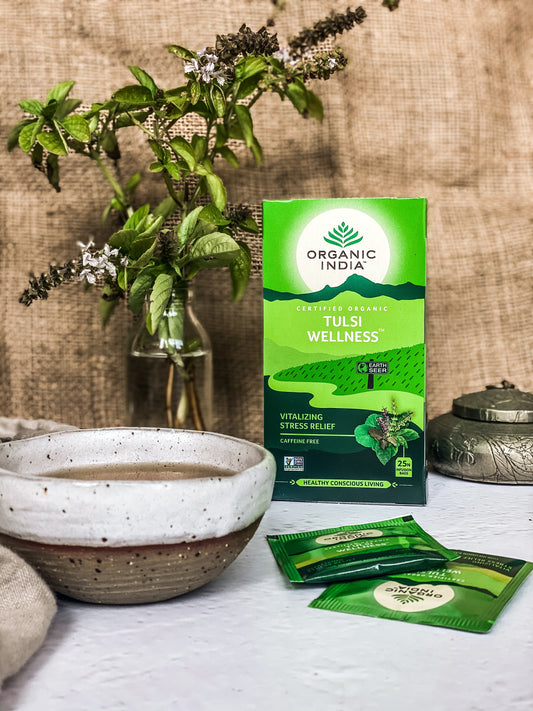The desire to care for and regenerate the health of our Earth is deeply held within so many of us. Perhaps never have we felt this so intensely as right now, as we watch the evidence of climate change unfold right before us in the form of bushfires, floods and record heatwaves.
More than ever we are looking for ways we can help. You might feel we are at a tipping point for change. Change from the old unsustainable ways of living and farming to ways that will not only replenish the earth, but reverse the rate of climate change.
Regenerative agriculture is a great example of a sustainable practice, a win-win for people and the planet, and ORGANIC INDIA is at the forefront of these sustainable practices. Let’s look at what that means.
WHAT IS REGENERATIVE AGRICULTURE?
Many conventional modern farming systems often include the use of heavy machinery, excessive tilling and harmful chemicals that disrupt the organic matter in the soil. These unnatural processes have sickened the living system within the soil, and in many cases have cut off vitality completely – ruining the health and sustainability in all too many agricultural ecosystems.
Regenerative agriculture incorporates farming systems that not only protect existing soil from prohibited chemicals and other inputs, but also promote soil regeneration, cultivating healthy soil. It incorporates agro-ecological farming and biodynamic farming.
In a nutshell, the five recognised principles of regenerative agriculture are:
- Keep the soil covered
- Minimise soil disturbance
- Maximise crop diversity
- Maintain living roots in the ground all year
- Integrate livestock
These principles translate on the ground via farming practices such as:
- Crop rotation
- Cover cropping
- Composting
- Reduced tillage
- Soil fertility management
- Seed collection
- Water management
HOW DOES REGENERATIVE AGRICULTURE HEAL THE ECOSYSTEM?
Regenerative agriculture values the generation of premium quality soil to create healthy, natural ecosystems and food crops. Some of the many ecological benefits of regenerative agriculture include:
- Benefits to the Soil
‘We are utterly dependent on other species and we have to take care of them. Soil represents the entire natural world. Without soil there is no food and without food there is no life, trees, forests, animals or people.’ Satish Kumar
Regenerative agriculture:
- Builds healthy, biologically-diverse and mineral-rich soils. These farming techniques remineralise the soil.
- Prevents soil erosion. Why is that important? Increased sediment runoff, increases sedimentation in rivers and on coastal reefs, reduces the clarity of water, which in turn restricts the health of light-dependent animals and plants.
- Benefits to Surface Waters: Creeks, Rivers and Estuaries
Regenerative agriculture:
Protects our creeks, rivers and estuaries from damaging pesticide and fertliser-laden runoff.
Fertilisers in our surface waters increases nutrient availability in the water column which can lead to:
– Nutrient-driven algal blooms
– Favouring invasive weed species that outcompete natives and change the food chain
– Promotion of de-oxygenation of the water which can result in fish kills
– Limiting the availability of food for species higher up the food chain
– Issues in the receiving waters such as marine ecosystems (discussed below)
Removing fertilisers protects the natural nutrient balance for a healthy ecosystem.
- Benefits to Marine Waters
Regenerative agriculture:
Protects marine ecosystems, such as coral reefs, from nutrient pollution. How?
The runoff from farms that travels across the land into local drainage channels, creeks, streams, rivers and discharges from the local estuaries into the ocean has the potential to be carrying large quantities of nutrients in the form of fertilisers. The reef ecosystem relies on naturally low nutrient water for healthy functioning.
Nutrient laden runoff is associated with:
- Algal blooms that smother and kill corals
- Micro-organism species shift – changing the food chain
- Outbreaks of the coral-eating Crown-of-Thorns starfish
- Changes to the balance of the entire ecosystem
Receiving waters can be very sensitive to runoff from modern agricultural practices which can have devastating effects. For example in Australia, the large agricultural catchments in northern Queensland empty near the World Heritage listed Great Barrier Reef.
- Benefits to Groundwater
Regenerative agriculture:
Protects the purity of groundwater.
Pesticides and fertilisers find their way into the groundwater as they percolate through the soil. Improper storage, mixing and application of pesticides and fertilisers can contribute to groundwater contamination. By removing their use altogether you eliminate this potential contamination.
- Benefits to Air Quality & Climate Change
Regenerative agriculture:
An antidote to climate change.
The world is just recently starting to realize that we have completely failed to recognise soil as the powerful carbon sink that it is. If the soil is healthy, full of rich, decaying organic matter, it soaks up CO2, making it a carbon sink = an awesome ally for reversing climate change.
Excessive tilling exposes the carbon molecules in the soil to the air where they combine with oxygen to create carbon dioxide (CO2), turning a natural carbon exchange system from healthy and fertile soil into a toxic atmospheric gas. This contributes to climate change by accelerating global warming.
‘It is estimated that at least 50% of the carbon in the earth’s soils has been released into the atmosphere over the past few centuries, partly due to destructive agricultural practices’. (2040 website).
- Benefits to the Ecosystem, that includes us!
Regenerative agriculture:
Builds healthy ecosystems.
By reinstating a more natural environment we are rebuilding a resilient, more balanced ecosystem. This in turn secures our healthy, future food supply by providing us with high quality, nutrient-dense food.
ORGANIC INDIA’S REGENERATIVE AGRICULTURE STORY
ORGANIC INDIA was formed in the 1990’s with a desire to create a holistic business that would eventually change the face of agriculture in northern India. The idea became a movement as organic and biodynamic farming methods were developed and practised. Our founder’s mission to offer safe, effective herbal products to the world is one of the driving forces behind the organic revolution.
ORGANIC INDIA believes in the power of regeneration. Every year, our network of farmers work thousands of acres of organic farmland in India to provide quality, organic crops and herbs, while simultaneously reversing environmental degradation in Indian farming communities.
All of our farmers are educated in organic and regenerative agricultural practices. Our intention is to leave the planet in better condition than we found it by committing to practices that heal the Earth, enrich biodiversity and regenerate the soil.
ORGANIC INDIA has never used synthetic chemicals, GMOs or irradiation. Our regenerative farming practices incorporate organic and biodynamic standards and treat each farm as a unique organism.
We also aim to return to the ancient practice of following the rhythms of nature, such as planting and harvesting according to lunar and other natural cycles. Many Indian farming traditions (Vrishka Ayurveda) were lost after the introduction of industrialized agriculture. We offer traditional and regenerative farming practices to our farmers that strengthen their communities and their faith in tradition.
WHAT CAN YOU DO?
A change for good is definitely in the air!! If you are looking for more ways you can help, support the rise of regenerative agriculture by choosing brands who are investing in, and embracing it.
These ancient principles, in modern practice, will not only create the healthy land, nutrient-rich foods and sustainable resources we need, but may also help to reverse climate change. Be part of the solution. Join the revolution.












